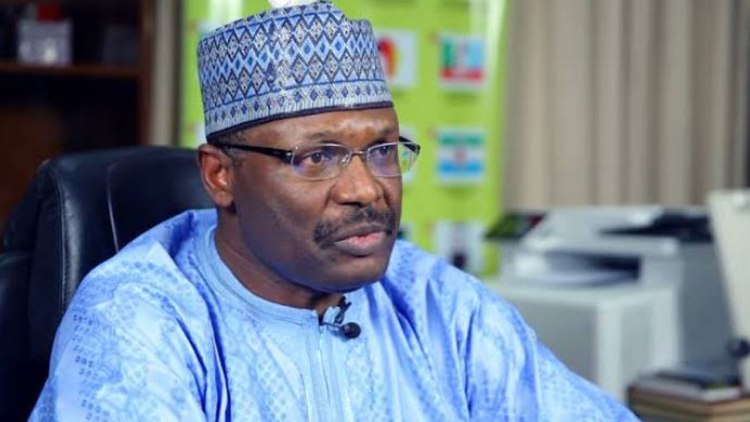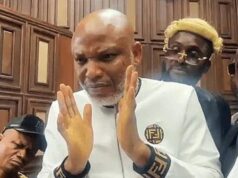As Nigeria grapples with increasing voter apathy, SUNDAY ISUWA writes that electronic voting could change the story in the 2023 general elections.
Nigeria spends billions of naira preparing for general elections but records show voter apathy is on the increase.
Voter apathy peaked during the 2019 general elections with President Muhammadu Buhari elected by 15 million people when Lagos State alone has a population of over 14.8 million.
Even though a national commissioner of INEC, Prof Antonia Okoosi-Simbine, said there are no readily available records of the 1999 general elections, the voter turnout has since been on a decline after Nigeria entered its Fourth Republic.
In 2003, voter participation was 69 percent. It later dropped to 57 percent in 2007; to 54 percent in 2011; 44 percent in 2015; and to an all-time low of 35 percent in 2019.
In the 2019 general elections, out of a voting-age population of 106.4 million, only 82 million Nigerians registered to vote, and only 28 million of those registered voters eventually voted.
Records show that in every general election, INEC spends billions of Naira in preparation, logistics, and printing of electoral materials for all registered voters but in recent times not half of the registered voters have been able to turn out on election day.
In the 2015 general elections, INEC budgeted N120 billion for 70 million registered voters, but only 29.4 million people voted. If the cost per capita was N1,714.28 which means that N78.1 billion of Nigeria’s commonwealth was wasted.
In the 2019 general elections, INEC budgeted about N189 billion for 82 million registered voters, but only 28 million people voted. If the cost per capita was N2304.82, then Nigeria wasted N124.4 billion.
According to data analysed from the CIA World Factbook, about 125million Nigerians will be of voting age in 2023.
Since INEC’s budget for the next general elections will increase substantially to match the figure, some Nigerians including political parties and Civil Society Organisations want more Nigerians to mobilise for the election in order to cut waste of resources.
Political parties have admitted that mobilising voters is a serious task, calling on INEC to reintroduce the financial support programme that was given to them before.
The Inter-party Advisory Council (IPAC) said electronic voting will reduce the issue of voter apathy adding that they also need INEC’s financial support to mobilise their supporters.
IPAC’s publicity secretary, Agbo Major, said even though irregularities in the conduct of the election causes voter apathy, the full implementation of electronic voting will instill confidence in Nigerians to vote.
“The major reason for voter apathy is because they feel their vote will not count. Sometimes they say the results announced are not a reflection of their votes.
“By the time we have full-blown electronic voting, there won’t be voter apathy anymore because the people will know that whatever vote they cast will count,” Major said.
He added that people will have more trust in the system and will go out to cast their votes.
Blaming the non-mobilization of voters by political parties to non-support from INEC, Major said the decline in the number of people that vote during elections has been consistent.
“As at 2003- 2007, the turn out was better than what you see today.
The parties were up to their tasks. They did very well in mobilizing the people to come out. The parties enjoyed support then. The parties were funded in the direction of voter mobilization from taxpayers’ money and all of that. But today, INEC is not supporting the parties.
Only parties that have governments at various levels are able to fund their activities very well. The job to get people out to come out and cast their votes is not a tea party. It is a very big assignment. It requires a lot of mobilization and funding.
“One of the things we want INEC to do is to support the political parties to mobilize their members to vote in the 2023 general election.”
“If we ensure a substantial increase in voter turnout from the previous 28 million, perhaps we can then justify the huge sums of money that will be appropriated by the National Assembly to INEC for the upcoming 2023 elections,” the convener of WeVote, Obinna Osisiogu.
Osisogu, whose non-partisan movement seeks meaningful and increased voter turnout in 2023, said Nigeria’s democracy is threatened by the alarming rate of voter apathy which must be checked.
He added that community, CSOs, and faith-based organizations are critical to stemming the tide.
“Many businesses, churches, and mosques have broad internal and external channels of communication which can optimize the dissemination of voter education programs and tools to increase voter participation. The business bloc benefits from good governance and is also greatly affected by bad governance. It is therefore essential and in its best interest to promote voter participation in a nonpartisan manner, with an emphasis on participation over politics,” he said.
While calling for political party reforms that promote inter and intra party strategies to curb electoral violence and voter apathy, Osisiogu said they are advocating for the implementation of a 10-point citizen agenda for electoral reform put forward by Yiaga Africa and other CSOs.
But INEC said it has already commenced mobilization of voters ahead of the 2023 general election. It blamed voter apathy, in recent times, on unfulfilled promises by politicians, election violence, and improper mobilization of voters by political parties.
Speaking to LEADERSHIP, the chief press secretary to INEC chairman, Mr. Rotimi Oyekanmi, said the commission has already taken the lead at ensuring voters turn out in the future elections.
“We have embarked on a nationwide exercise to expand voter access to polling units. Countries with higher voter turnout percentages during elections also have adequate and convenient voting locations for eligible voters. The number is periodically adjusted following the increase in voter population.
“For the past 25 years, the number of polling units has remained the same in Nigeria, which is a disincentive for would-be voters. That is why the Commission’s current exercise is essential. The Commission will step up its voter and civic education efforts and will continue to work with stakeholders in this regard. However, political parties and civil society organizations need to join hands with the Commission because we cannot do it alone.
“Political parties must do more in the areas of voter mobilization for elections, which is not the same as vote-buying. It is about sharing their manifestos or ideas that can motivate their supporters to come out and vote on election day.
“Besides, unfulfilled promises by elected officials can discourage voters from participating in future elections. When elected persons fail to fulfill their promises, voters tend to lose interest in casting their ballots,” Oyekanmi said.
On what should be done to cut the cost of elections, Oyekanmi said: “Careful and gradual infusion of technology into our electoral system is one of the innovative ways of cutting costs. However, the 1999 Constitution of the Federal Republic of Nigeria (as amended) and the Electoral Act 2010 (as amended) need to be adjusted to give room for an improved electoral system and avoid wastages.”
On the delay by members of the National Assembly to pass the electoral act amendment bill, Oyekanmi said it is not affecting their preparations.
“The commission has submitted recommendations to the National Assembly on the specific areas of the Electoral Act 2010, where changes are desirable to improve the country’s electoral system.
“We are hopeful that the amendment process will be done expeditiously to allow the Commission to apply the new law for the 2023 General Election.
“However, we are already preparing for the 2023 general election. We cannot afford to wait or put all preparations on hold until the
The National Assembly passes the new Electoral Act,” he added.
As Nigerians await the National Assembly’s passage of the Electoral Act, some pundits aver that it might be a wasted effort if the document does not allow for electronic voting.
SOURCE; https://leadership.ng/will-electronic-voting-solve-nigerias-voter-apathy-problem/




